Lesson7It'sseventhirty-five.
五年级下册英语教案-Lesson7It'sseventhirty-five科普版(三起)

五年级下册英语教案Lesson 7 It's seven thirtyfive 科普版(三起)教学内容本课为科普版(三起)五年级下册英语第七课,主题为时间表达。
课程内容围绕如何用英语表达时间,特别是在询问和回答当前时间时的常用句型和表达方式。
通过本课的学习,学生能够掌握基本的英语时间表达方法,并能够在日常生活中进行简单的时间交流。
教学目标1. 知识目标:学生能够听懂、会说、会读本课的单词和句子,理解时间表达的句型结构。
2. 技能目标:学生能够在实际情景中运用所学知识,正确询问和回答时间。
3. 情感目标:培养学生的时间观念,提高学生的英语学习兴趣和自信心。
教学难点1. 时间表达的语法结构,尤其是分钟数大于30时的表达方式。
2. 时间词汇的发音和记忆,如“half past”和“quarter to”等。
3. 学生在实际交流中对时间的灵活运用。
教具学具准备1. 课件或黑板,用于展示和讲解时间表达的方法。
2. 实物时钟或电子时钟,用于模拟时间问答的情景。
3. 时间卡片,用于辅助学生记忆和练习时间表达。
4. 录音机或音响设备,用于播放教材中的听力材料。
教学过程第一阶段:导入通过复习上一课的内容,自然过渡到本课的学习。
利用实物时钟或电子时钟,展示不同的时间点,引导学生用中文询问和回答时间。
第二阶段:新课内容展示展示课件或黑板,介绍本课的主要句型和时间词汇。
通过示例和练习,让学生理解并掌握时间表达的语法结构。
第三阶段:互动练习分组进行角色扮演,模拟询问和回答时间的场景。
使用时间卡片,进行快速反应练习,加强学生对时间表达的熟练度。
第四阶段:听力练习播放教材中的听力材料,让学生听懂并能够复述时间信息。
进行听力理解练习,检查学生对听力材料的理解程度。
布置相关的作业,巩固学生对本课知识点的掌握。
板书设计1. 时间表达的主要句型,如“What time is it?”和“It's seven thirtyfive”。
Lesson 7 It's seven thirty-five

Reading
Mum: Get up! Get up! Son: What’s the time, mum? Mum: It’s seven fifty. You’re late. Son: Oh, no!
Reading
Presentation
What time is it? It’s seven o’clock.
Presentation
What time is it? It’s four five. It’s five past four.
Presentation
What time is it? It’s nine thirty. It’s half past nine.
Son: Mum, it’s not seven fifty. It’s six fifty-five. Mum: Oh, yes. So let’s have a big breakfast. Son: OK. Mum.
Discussion
Look and match
Reading
Read the story, then answer two questions.
A game
Can you line them?
a quarter to eight five past four a quarter past seven half past nine
Discussion What time does she get up?
Presentation
What time does she get up? She gets up at seven o’clock.
五年级英语下册Lesson7《It’sseventhirty_five》 优秀课件3科普版

奶奶:好的,我知道了。
汤姆:现在几点了,奶奶? 奶奶:7点35分。 汤姆:哦,到了去上学的时间了。 我必须得பைடு நூலகம்了。再见,奶奶。
奶奶:再见。
名言摘抄 ● 青年时种下什么,老年时就收获什么。 ──易卜生 ● 人并不是因为美丽才可爱,而是因为可爱才美丽。 ──托尔斯泰 ● 人的美德的荣誉比他的财富的荣誉不知大多少倍。──达· 芬奇 ● 人的生命是有限的,可是,为人民服务是无限的,我要把有限的生命,投入到无限的为人民服务之中去。 ──雷锋 ● 人的天职在勇于探索真理。 ──哥白尼 ● 人的知识愈广,人的本身也愈臻完善。──高尔基 ● 人的智慧掌握着三把钥匙,一把开启数字,一把开启字母,一把开启音符。知识、思想、幻想就在其中。 ──雨果 ● 人们常觉得准备的阶段是在浪费时间,只有当真正机会来临,而自己没有能力把握的时候,才能觉悟自己平时没有准备才是 浪费了时间。 ──罗曼.罗兰 ● 人生不是一种享乐,而是一桩十分沉重的工作。 ──列夫· 托尔斯泰 ● 人生应该如蜡烛一样,从顶燃到底,一直都是光明的。 ──萧楚女 ● 人需要真理,就像瞎子需要明快的引路人一样。 ──高尔基 ● 任何问题都有解决的办法,无法可想的事是没有的。 ──爱迪生 ● 如果你希望成功,当以恒心为良友,以经验为参谋,以当心为兄弟,以希望为哨兵。 ──爱迪生 ● 如果是玫瑰,它总会开花的。 ──歌德 ● 如果我比笛卡尔看得远些,那是因为我站在巨人们的肩上的缘故。 ──牛顿 ● 善于利用零星时间的人,才会做出更大的成绩来。 ──华罗庚 ● 少而好学,如日出之阳;壮而好学,如日中之光;老而好学,如炳烛之明。 ──刘向 ● 生活便是寻求新的知识。 ──门捷列夫 ● 生活得最有意义的人,并不就是年岁活得最大的人,而是对生活最有感受的人。 ─卢梭 ● 生活的理想,就是为了理想的生活。 ──张闻天 ● 生活的情况越艰难,我越感到自己更坚强,甚而也更聪明。 ──高尔基 ● 生活的全部意义在于无穷地探索尚未知道的东西,在于不断地增加更多的知识。 ──左拉 ● 生活最沉重的负担不是工作,而是无聊。 ──罗曼· 罗兰 ● 生命的意义在于付出,在于给予,而不是在于接受,也不是在于争取。 ──巴金 ● 生命多少用时间计算,生命的价值用贡献计算。 ──裴多菲 ● 时间,就象海棉里的水,只要愿挤,总还是有的。 ──鲁迅 ● 时间是伟大的作者,她能写出未来的结局。 ──卓别林 ● 时间最不偏私,给任何人都是二十四小时;时间也最偏私,给任何人都不是二十四小时。 ──赫胥黎
Lesson7It'sseventhirty-five.
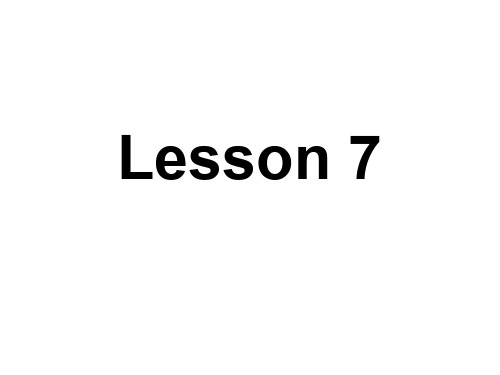
(go home, go to bed)
What time is it? It’s half past six.
half an apple half a lemon half an hour
A: What time is it? B: It’s half past _f_iv_e_.
• twenty-one 21
• twenty-two 22
• twenty-three 23
• twenty-four 24
• twenty-five 25
• twenty-six 26
• twenty-seven 27
• twenty-eight 28
• twenty-nine 29
twenty 二十 forty 四十 sixty 六十 seventy 七十 eighty 八十 ninety 九十
go home have supper go to bed
Time (时间) 6:30a.m. 7:00a.m. 7:20a.m. 11:30a.m. 4:50p.m. 6:00p.m. 9:30p.m.
Time is gold, money can’t buy time. 一寸光阴一寸金,
寸金难买寸光阴
It’s 4:50.
It’s time for supper.
.
12 .
9 。3
. .
6
. .
It’s 6:00.
It’s time to go to bed. It’s 9:00.
Tick tock, tick tock. It’s time for breakfast. (school, lunch, supper) Tick tock, tick tock . It’s time to have breakfast. (have lunch, have supper)
Unit 2 What time do you go to school英语人教版七年级下册精品课件

Lead in: Can you read the times?
What time is it , please?
It’s two o five . It’s five past two.
What time is it , please?
It’s three ten . It’s ten past three .
What time does Rick eat He eats breakfast at seven
breakfast?
o’clock.
When does Scott go to
work?
When do your friends
exercise?
what time和when都 可用来提问时间, 他 们的用法有何异同?
Unit 2 What time do you go to
school?
Section A Grammar Focus3c
Objects:
To learn to ask and answer What time questions. To learn to ask about and say times. To learn to use adverbs of frequency.
巧记:频度副词在句中的位置
➢ 频度副词很重要,句中位置要记牢; ➢ 放在实义动词前,助、be、情态动词后; ➢ sometimes最活跃,句首、句中、句末均可找。
拓展
➢ 对频度副词提问,用how often, 意为“多久一次”。
例:——你姐姐多久打一次篮球? ——她从不打篮球。 —How often does your sister play basketball? —She never plays basketball.
五年级下册英语教案Lesson7IT'SSEVENTHIRTY-FIVE科普版(三起)
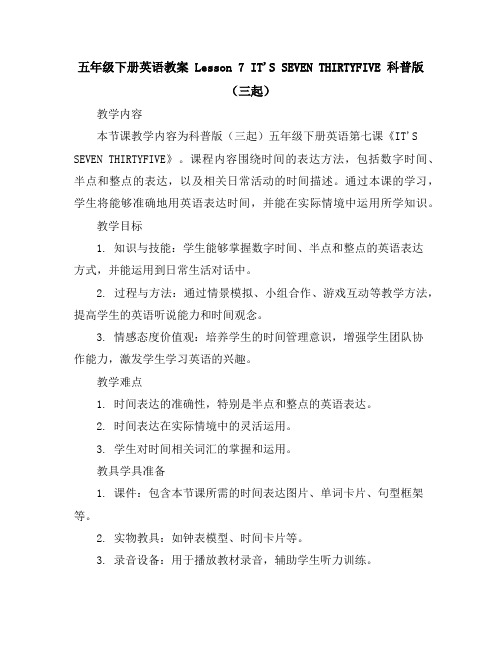
五年级下册英语教案 Lesson 7 IT'S SEVEN THIRTYFIVE 科普版(三起)教学内容本节课教学内容为科普版(三起)五年级下册英语第七课《IT'S SEVEN THIRTYFIVE》。
课程内容围绕时间的表达方法,包括数字时间、半点和整点的表达,以及相关日常活动的时间描述。
通过本课的学习,学生将能够准确地用英语表达时间,并能在实际情境中运用所学知识。
教学目标1. 知识与技能:学生能够掌握数字时间、半点和整点的英语表达方式,并能运用到日常生活对话中。
2. 过程与方法:通过情景模拟、小组合作、游戏互动等教学方法,提高学生的英语听说能力和时间观念。
3. 情感态度价值观:培养学生的时间管理意识,增强学生团队协作能力,激发学生学习英语的兴趣。
教学难点1. 时间表达的准确性,特别是半点和整点的英语表达。
2. 时间表达在实际情境中的灵活运用。
3. 学生对时间相关词汇的掌握和运用。
教具学具准备1. 课件:包含本节课所需的时间表达图片、单词卡片、句型框架等。
2. 实物教具:如钟表模型、时间卡片等。
3. 录音设备:用于播放教材录音,辅助学生听力训练。
教学过程1. 导入:通过唱英文歌曲《It's time to say hello》来营造英语学习氛围,同时复习上一节课的内容。
2. 新课展示:使用课件展示本课的主要教学内容,包括时间表达的图片和句型框架,引导学生学习新知识。
3. 小组合作:学生分组进行情景模拟,用英语表达不同时间点的日常活动,如上学、吃饭、睡觉等。
4. 游戏互动:设计“时间接力”游戏,学生在规定时间内用英语完成时间表达任务,增强学习的趣味性。
板书设计板书设计将围绕本节课的核心教学内容,包括时间表达的关键词汇、句型框架以及相关的日常活动时间描述。
通过清晰的板书布局,帮助学生更好地理解和记忆课程内容。
作业设计1. 书面作业:完成教材后的练习题,巩固时间表达的知识点。
2. 口头作业:学生回家后,向家长用英语介绍一天中的不同时间点及其相关活动。
Lesson7It’sseventhirty-five(Let'stalk)(教学设计)科普版英语五

小学英语科普版五年级下册Lesson 7 It’s seven thirty -five(Let's talk)教学设计一、教材分析:本课是小学英语科普版教材五年级下册第七课Lets talk内容,主要学习时间的表达,知道在什么时间做什么事情,进而引导学生学会表达自己的作息时间。
二、教学目标:1.知识目标:能听懂、会说以下单词和句型;Fifty breakfast Monday School is over at on Monday/Wednesday。
What time is it?It's... It’s time for...2.能力目标:正确运用What time is it?这个句型询问时间,并能使用It’s ...It’s time for...正确回答;并能流利的介绍自己学校的放学时间。
3情感态度目标:增进学生之间交流合作表演能力三、教学重难点:掌握重点句型,并能用句型“What time is it?”和“It’s ...It’s time for...”进行口语交际四、教学过程:Step l:Warm up1. Guess and do some actionsT: everyone, please listen. can you guess what’s this?Ss: It’s a clock.T: yes ,now let’s count from 12 to 1 .ok, do with me .tick, tock, tick, tock. time for English class. Welcome to my class.2.Watch a videoT:Are you happy? Do you like singing? let’s watch the video and do the action with the young man,OK?Ready. go!Step 2:Lead inT:Now please look at this clock, a clock can tell me the time . Is it seven o’clock?Ss:NO.T:Is it seven thirty?Ss: No。
五年级下册英语教案-Lesson7It'sseventhirty-five科普版(三起)
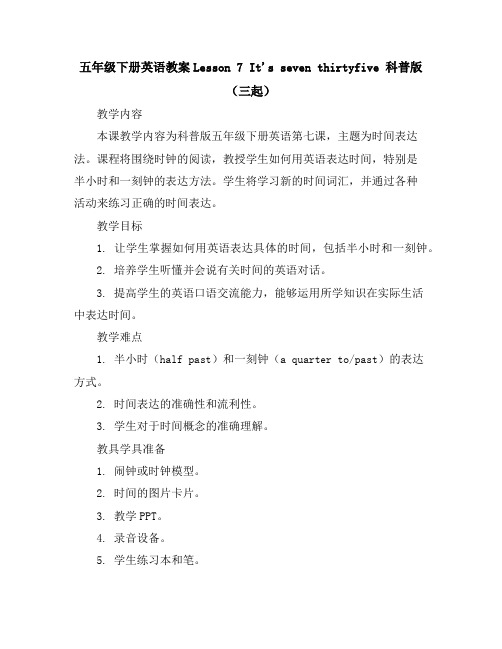
五年级下册英语教案Lesson 7 It's seven thirtyfive 科普版(三起)教学内容本课教学内容为科普版五年级下册英语第七课,主题为时间表达法。
课程将围绕时钟的阅读,教授学生如何用英语表达时间,特别是半小时和一刻钟的表达方法。
学生将学习新的时间词汇,并通过各种活动来练习正确的时间表达。
教学目标1. 让学生掌握如何用英语表达具体的时间,包括半小时和一刻钟。
2. 培养学生听懂并会说有关时间的英语对话。
3. 提高学生的英语口语交流能力,能够运用所学知识在实际生活中表达时间。
教学难点1. 半小时(half past)和一刻钟(a quarter to/past)的表达方式。
2. 时间表达的准确性和流利性。
3. 学生对于时间概念的准确理解。
教具学具准备1. 闹钟或时钟模型。
2. 时间的图片卡片。
3. 教学PPT。
4. 录音设备。
5. 学生练习本和笔。
教学过程第一阶段:导入利用闹钟声音引入时间主题,激发学生兴趣。
通过问答形式复习之前学过的时间表达。
第二阶段:新知识学习展示时钟模型,教授新时间词汇。
通过PPT展示和讲解,让学生理解半小时和一刻钟的表达方式。
进行听力和口语练习,加强学生对新知识点的掌握。
第三阶段:互动练习分组进行角色扮演,模拟时间询问和回答的场景。
进行“时间接龙”游戏,练习快速准确表达时间。
第四阶段:巩固和应用学生用自己的闹钟设定不同的时间,用英语向同学展示并询问。
教师提供一些日常场景,学生练习在具体情境中运用时间表达。
板书设计1. 新学的时间词汇。
2. 半小时和一刻钟的表达公式。
3. 重点句型框架。
4. 课堂练习的示例。
作业设计1. 完成练习册上的相关练习题。
2. 创作一段包含时间表达的英语对话。
3. 记录并翻译一天中的重要时间点(如上课、午餐、放学等)。
课后反思课后,教师应反思教学过程中的效果,包括学生对新知识点的掌握程度、课堂活动的互动性和趣味性,以及时间表达在实际生活中的应用情况。
五年级下册英语教案-Lesson7It’sseventhirty-five∣科普版(三起)

五年级下册英语教案Lesson7 It’s seven thirtyfive∣科普版(三起)教学内容本课教学内容为科普版五年级下册英语Lesson7,主题为时间表达法。
课程将围绕日常生活中常见的时间点,教授学生如何准确表达时间,包括整点和非整点的表达方式。
学生将通过本课的学习,掌握如"It's seven thirtyfive" 的句型结构,并能运用所学知识在具体场景中进行时间询问和时间告知。
教学目标1. 知识目标:学生能够听懂、会说、会读本课的关键词汇,如'clock, half past, quarter to'等,并能正确运用这些词汇表达时间。
2. 能力目标:学生能够在不同的生活场景中运用英语询问和告知时间,提高日常交流能力。
3. 情感目标:培养学生的时间观念,增强其守时意识,同时激发学生对英语学习的兴趣。
教学难点本课的教学难点在于学生对非整点时间的表达方法的理解和运用,尤其是分钟数为5的倍数时(如25分、35分)的表达方式。
学生还需注意区分上午(a.m.)和下午(p.m.)的时间表达。
教具学具准备1. 课件:包括时间表达法的图片和音频材料。
2. 实物教具:模拟时钟或电子时钟。
3. 学习材料:词汇卡片、练习册。
教学过程1. 导入:利用课件展示不同的时间图片,引导学生复习已学过的整点时间表达法,如 "It's seven o'clock"。
2. 新授:引入非整点时间表达的概念,教授 'half past,quarter to' 等词汇,并通过模拟时钟演示,让学生直观理解。
3. 练习:学生分组练习,用英语互相询问和告知时间,教师巡回指导。
4. 游戏:设计时间表达游戏,增强学生对新学知识的运用能力。
5. 巩固:通过课件展示不同场景,学生需根据场景中的时间线索,用英语准确表达时间。
板书设计板书将简洁明了地呈现本课的关键词汇和句型结构,包括:关键词汇:clock, half past, quarter to句型结构:It's seven thirtyfive作业设计1. 学生需完成练习册中与本课相关的练习题。
初中英语教案新概念2 lesson 12(学生版)-许青梅(001)

新概念二 lesson 12一、根据课文内容回答下列问题。
1. Whom shall we meet at Portsmouth Harbor early tomorrow morning?____________________________________________________________________________________________2. Where will he be?____________________________________________________________________________________________ 3. At what time will he leave?____________________________________________________________________________________________ 4. Shall we say goodbye to him, or shall we travel with him?____________________________________________________________________________________________ 5. What will he take part in?____________________________________________________________________________________________二、根据答案,对本文章进行口头转述。
____________________________________________________________________________________________ ____________________________________________________________________________________________ ____________________________________________________________________________________________ ____________________________________________________________________________________________Goodbye and good luck1. luck n. 运气,幸运1)good luck______ bad luck________Wish you good luck!2)by luck 侥幸地I won the game by luck.3)lucky dog_________You’re really a lucky dog!2.set outset out to do sthHe will set out to do homework as soon as his mother comes back,【拓展】1) set down2) set off ,侧重于去某个地方,=leave for.If you want to catch that train we'd better set off for the station immediately.3) set about,与set out意思相近,但set out后加不定式,即set out to do sth,而set about后加 ing形式,即set about doing sth.Do you know how to set about going on this work?【练习】根据句子意思选择set off/ set out/ set about/ set down的正确形式填空。
Lesson7It'sseventhirty-five.
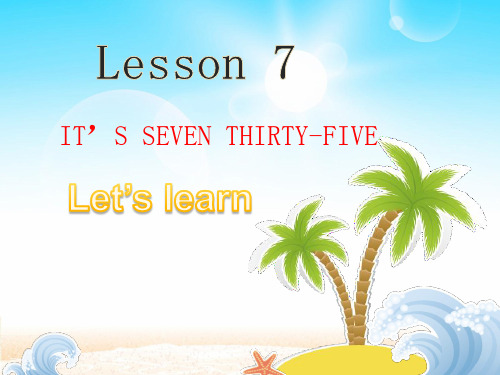
It’s three o’clock.
What time is it?
It’s nine o’clock.
What time is it?
It’s twelve o’clock.
时间表达法
顺读法:表达几点钟,开头要用It is (It’s ) + 钟点数 + 分钟数 “几点几分”
Let’s learn
For today’s homework
Design your timetable (根据今天学习的内容,制作自己 一天的作息时间。)
Thank you!
Practices
time 6:35 7:00 7:30 8:00 12:00 16:15 17:15 19:00
Sth get up breakfast school classes lunch home homework dinner
A gift
summary
What time is it ? It’s …… It’s time for ……
IT’S SEVEN THIRTY-FIVE
Lead in
A guessing game: 远看一座亭,近看不是亭。 亭里十二字,个个看分明。
How to ask time?
What’s the time? =What time is it ? (现在几点了?)
It’s ……
What time is it?
— What time is it? — It’s six thirty.
It’s time for breakfast.
Let’s learn
— What time is it? — It’s seven ten.
It's_time_to_do_something

get up
work
12:00 a.m.
6:00 p.m.
have lunch
have dinner
10:00 p.m.
go to bed
My dream day
10:00 p.m. go to bed
6:00 p.m. have dinner
9:00 a.m.
get up
11:30 a.m. have lunch 2:00 p.m. play
6:00 p.m. 7:00 p.m. 8:30 p.m. 11:20 a.m. favorite lesson
get up go to school have flying lessons have dinner art
Tom’s day
“his”
Amy’s day
6:30 a.m.
7:20 a.m.
1
2
3412源自34Pair work:
What’s the time?
It’s … . It’s time to … .
It’s time to chant.
Time,time,time,time,time. It’s time to get up,get up. Time,time,time,time,time. It’s time to get up. It’s time to get up and take a shower. Get dressed, eat breakfast and go to school.
Group work:
A: Hello, … ! B: Hello, … ! Oh, it’s time to … . A: What’s the time, please? C: It’s … . D: How time flies! Let’s go. Together: OK!
五年级下册英语Lesson 7 It's seven thirty-five Lesson 1 现在几点啦?科普版
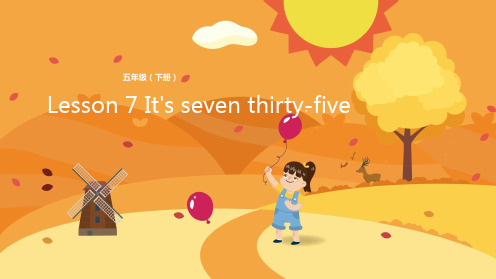
知识讲解 时间的表达 3.如果所表述的时间在半小时之内,可以用“分钟 + past + 小时”:
3:24 twenty-four past three 5:02 two past five
知识讲解 时间的表达 4.如果所表述的时间在半小时之外,可以用“(相差的) 分钟+to+(下一)小时”:
2:38 twenty-two to three 5:47 thirtheen to six
知识讲解
Let’s draw.
知识讲解
ten to ten half past four a quarter to eleven
Thanks and see you in the class!
知识讲解
时间的表达
若想表明是上午,可在时间后加上a.m. 如:thirteen past six a.m.(上午六点十三分)。 若想表明是下午,可在时间后加上p.m. 如:four o’clock p.m.(下午四点)。
时间的表达 常用短语: in the morning in the afternoon in the evening at night
知识讲解 时间的表达 1.整点用数词(+o’clock) 现在是中午12点 It’s (twelve) noon. 现在是半夜零点 It’s (twelve) midnight.
6:00 six o’clock
知识讲解 时间的表达 2.所有非整点的时间都可以用“小时 + 分钟”直接读:
10:23 ten twenty-three 5:47 five forty-seven
知识讲解
时间的表达
大约时间: It’s almost two. 马上到两点了。 It’s not quite two. 还不到两点。 It’s just after two. 刚过两点。 It’s a little past two. 两点多一点。
科普版英语五年级下册课文(电子档)
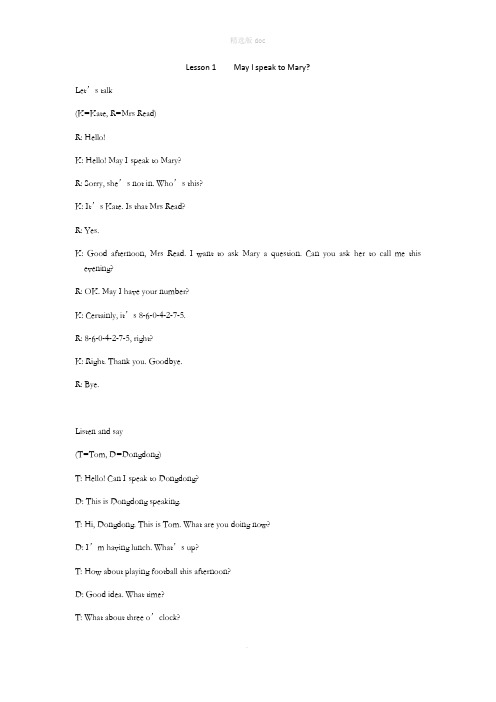
Lesson 1 May I speak to Mary?Let’s talk(K=Kate, R=Mrs Read)R: Hello!K: Hello! May I speak to Mary?R: Sorry, she’s not in. Who’s this?K: It’s Kate. Is that Mrs Read?R: Yes.K: Good afternoon, Mrs Read. I want to ask Mary a question. Can you ask her to call me this evening?R: OK. May I have your number?K: Certainly, it’s 8-6-0-4-2-7-5.R: 8-6-0-4-2-7-5, right?K: Right. Thank you. Goodbye.R: Bye.Listen and say(T=Tom, D=Dongdong)T: Hello! Can I speak to Dongdong?D: This is Dongdong speaking.T: Hi, Dongdong. This is Tom. What are you doing now?D: I’m having lunch. What’s up?T: How about playing football this afternoon?D: Good idea. What time?T: What about three o’clock?D: OK. Where shall we meet?T: At the sports centre, OK?D: OK.ReadMaking a pizzaMom, are you making a pizza? May I help you?Yes, Tom. Thanks.Mom, can I learn how to make it?Certainly.Can I put some water into it now?Yes, please.Let me put some meat on it, OK?OK.Can we bake it now?Yes, we can.Mom, it’s done. May I eat some now?Of course, you may! You did a great job.Lesson 2 We mustn’t cross the street now. Let’s talk(J=Jim, M=Mum)J: Are you going shopping, Mum?M: Yes.J: May I go with you?M: Yes, but you mustn’t run in the street.J: OK.M: Look at the red light. We mustn’t cross the street now.J: OK.M: Now the light is green. We can cross the street.J: Yes.M: Look at these white lines. We must cross the street here.J: Oh, I see.Listen and say(G=Girl, B=Boy, W=Woman)G: Look, a seat! You can sit here.B: No, you sit here, please.G: Thank you.B: Look, an old granny!G: I should give my seat to her.B: Yes.G: Hello, Granny! Please sit here.W: Oh, thank you.G: You’re welcome.ReadDon’t cross the street here.Tom and his cousin Bob are going to play football. Now they are walking in the street. Bob is playing with his ball. “Hi, Bob! You mustn’t play with your ball here,” says Tom. “All right,”Bob answers.“Oh! You mustn’t cross the street here. We must cross there.”“Oh, yes.”“Don’t cross now. The light is red. We must wait.”“OK.”“Look! The light is green.”“We can cross now.”“Yes. Let’s go.”Lesson 3 How many pupils are there? Let’s talk(K=Kate, D=Dad)D: Hi, Kate! What are you doing?K: I’m making some flowers for our classroom.D: Do you have a new classroom this term.K: Yes, Dad.D: Is it nice?K: Yes. We have a big glass blackboard.D: Do you have a clock in your classroom?K: Yes, We have a new clock and we have some green plants, too.D: How many pupils are there in your class this term?K: There are forty-five.D: Oh, that’s a big class.ReadDoing a good job.Some people drop things everywhere. They drop paper in the streets. They drop bottles in the parks. This makes the streets and parks very dirty. But many of the things are useful. We shouldn't throw them away. It’s Sunday. There are many pupils in the park. They are picking up useful things. Mike and Li Lin are picking up bottles. Jill and Liu Xin are putting them into a bag. How many bottles are there? There are forty-eight. Mary and Meimei are picking up paper. Ann is putting the paper into a bin. How much paper is there? About half a kilo. The pupils are doing a good job, and they are very happy.Lesson 4 Where do you live? Let's talk(B=Boy, M=Man)B: Excuse me. Where do you come from?M: I come from the USA.B: Where do you live?M: I live in New York.B: Where do Ms Green come from?M: She comes from the USA, too.B: Does she live in New York, too?M: No, she doesn't. She lives in Washington.Listen and say.(P=policeman, L=Lingling)P: Hi, little girl. Why are you crying?L: I can't find my mum.P: Oh, don't worry. I can help you. What's your name?L: Lingling.P: How old are you?L: Four.P: Where do you live?L: I live in a tall building.P: OK. Do you know your mother's phone number?L: Yes, it's 6253382.P: OK. Let me call your mother.L: Thank you.Read for fun.A kind doctorLiu Jun is a doctor. He comes from Sichuan. Now he is working in a small town in Yunnan. He is always ready to help others.One day a farmer came to his office.“ My wife is very ill. Can you come and see her?”“ Where do you live?” asked Liu Jun.“ I live in a small village. ““ OK. Let's go at once. “They walked for a long time and got to the village very late.Liu Jun examined the sick woman and gave her some medicine.The farmer took out some money and gave it to him. Liu Jun didn't take it.The farmer thanked him, but Liu Jun said,” It's my pleasure. I'm happy to help others.”Lesson 5 What do you do? Let's talk(G=Girl, F=Farmer)G: What do you do?F: I'm a farmer.G: Where do you work?F: I work on a farm.G: Is your work easy?F: No, it isn't.(G=Girl, P=Policeman)G: Are you a policeman?P: Yes, I am.G: Where do you work?P: I work in the street.G: Is your work interesting?P: Yes. I like it very much.Listen and sayA: Hi!B: Hello!A: Where do you come from?B: I come from the UK.A: Do you work in this city now?B: Yes, I do.A: What do you do?B: I'm a doctor.A: That's a good job. Where do you live?B: I live near the hospital.A: Do you like this city?B: Yes. It's beautiful, and people here are very nice.ReadWhich girl can get the job?Mr Smith is a manager. He wants an office worker. Two girls want to get this job. Mr Smith doesn’t know who to choose. Then he has an idea.“ Excuse me. Is Mr Smith here?”“ No, he isn't.”“What do you do?”“ I'm a cleaner.““ Go and find your manager.““ OK. But can you help me clean the room?”“ No. It's not my job. I can't help you.““ Let me help you.”“Thank you. You are so kind.““ Hello. Y es, this is Mr Smith.““ You are Mr Smith?”“ Yes.““ What do you do?”“I'm the manager.“Now Mr Smith knows who to choose. Which girl can get the job? Can you guess?Lesson 6 Revision Let's talk(D=Dongdong, M=Mum)D: Mom, can I play football with Tom?M: Certainly. But you mustn’t play football in the street. D: OK.(Q=Qiqi, W=Mrs White)Q: Where do you come from, Mrs White?W: I come from the UK.Q: Do you live in Beijing now?W: Yes, I do.Q: What do you do?W: I'm a doctor.Q: Where do you work?W: I work at Heping hospital.Q: How many doctors are there in your hospital.W: There are thirty-four.Lesson7 It's seven thirty-five. Let’s talk(T=Tom, G=Grandma)G: Tom, breakfast is ready. Please sit down.T: Thank you Grandma.G: What time is school over?T: School is over at three forty on Tuesday, Thursday and Friday.G: What about Monday and Wednesday?T: School is over at four thirty on Monday and at two fifty on Wednesday. G: OK, I see.T: What time is it, Grandma?G: It's seven thirty-five.T: Oh, it's time for school. I must go. Goodbye, Grandma.G: Goodbye.Listen and say.Mom: Get up! Get up!Son: What's the time, Mum?Mom: It's seven fifty. You are late.Son: Oh, no.Son: Mom, it's not seven fifty. It's six fifty-five.Mum: Oh, yes. So let's have a big breakfast.Son: OK, Mum.ReadThe ball in the hole.It's four fifty. School is over. Li Ming and Wang Ying are walking home. On the way they see a boy. He is crying.“ What's wrong?” Li Ming asks.“ My ball is in that hole. I can't get it out.”“ Don't worry. Wee can help you. “They try to take the ball out, but the whole is too deep. They think and think, and then Li Ming has an idea. H e says, “we can use water.” They get some water and fill the hole with it. Then the ball comes up. Wang Ying gives the ball to the boy. The boy smiles and thanks them for their help.Lesson 8 What day is it today?Let’s talk(D=Dongdong, K=Kate)D: What day is it today?K: It’s Monday.D: What classes do you have this morning?K: We have Chinese, maths, English and art.K: Do you have English lessons on Wednesdays?D: No, we don’t.K: When do you have English?D: On Tuesdays, Thursdays and Fridays.K: Do you have PE on Fridays?D: No. We have PE on Tuesdays.Listen and say(B=Boy, G=Girl)B: Do you have the timetable?G: Yes, I do.B: I want to make a new timetable. Can you help me?G: Certainly.B: What classes do we have on Monday morning?G: We have maths, English, Chinese and computer class.B: (Says and writes) Maths, English, Chinese and computer class. OK. What about Monday afternoon.G: We have science and art.B: (Says and writes) Science and art. OK....ReadAn email to Eve.Eve is ill and she didn’t come to school today. Lulu is writing an email to her now.Dear Eve,I’m sorry to hear that you’re ill and can’t come to school.Let me tell you what we did today.Today we had six classes. We had maths, English, Chinese and art in the morning. We have a new maths teacher this term. Her name is Sarah Black. She is very nice. In English class we learned an American song Old Black Joe, and in Chinese class we studied a short story. We drew pictures in art class. I drew some flowers. The teacher said I did a good job.In the afternoon, we had two classes, science and PE. Science is a new subject. It’s very interesting. In PE class we played basketball.Hope to see you soon.LuluLesson 9 Do you always have lunch at twelve?(L=Lulu, T=Tom)L: What time is it?T: It’s twelve o’clock.L: Oh, it’s time for lunch.T: Yes, it is.L: Do you always have lunch at twelve?T: Yes, I do. What about you?L: I usually have lunch at eleven thirty. Sometimes I have lunch at twelve.T: What do you usually have for lunch?L: Rice, chicken and soup.Read, choose and sayA: I’m doing a survey. Can I ask you some questions?B: Oh, yes.A: (Are / Do) you from the USA?B: Yes, I (am/ do).A: What food (are/ do) you often have?B: We often have hamburgers.A: (Are/ Do) you usually drink tea?B: No we (aren’t / don’t). We usually drink coke.A: Thank you.B: You’re welcome.ReadIs he late?I usually get up at 6:30, but now it’s 8:00. It’s time for school. I’m late.I always do morning exercises at 7:10, but today I have no time.Mun always makes breakfast at 7:00, but she isn’t in the kitchen today. She isn’t in the bedroom. She isn’t in the toilet, either. Where is she?Dad always takes me to school at 8:00, but he isn’t at home now, so I have to run to school.“ What are you doing, Scott?”“ I’m going to school. I’m late.”“ Late? No, you’re early. It’s only 4:45.”“ Oh, I see. The clock in my room isn’t working.”Lesson 10 Does she always come before six thirty? Let’s talk(L=Lulu, D=Dongdong)L: Eve comes here every morning. But where is she today?D: I don’t know. Does she do morning exercises here every day?L: Yes, she does.D: Does she always come before six thirty.L: Yes, she does.D: What time is it now?L: It’s about seven. I’m afraid she isn’t feeling well today.D: Let’s go and see her, OK?L: OK. Let’s go.Listen and say(L= Li Bing, E=Eve)L: Hey, look at that boy. Who is he?E: He’s Jimmy. He’s new here.L: Does he come from the UK?E: No, he comes from the USA.L: Does he like sports?E: Yes, he does. He plays basketball very well.L: Let’s say hello to him.E: OK. Let’s go.ReadMiss Rabbit and Mr Fox.Mr Fox and his friends are playing in a forest. Suddenly they hear someone crying,”Help! Help!”It is Miss Rabbit. She is in a pit. She says to Mr Fox,”Hi, Mr Fox! Please help me.”Mr Fox says,”Oh, Miss Rabbit. Don’t worry. We will help you.”Mr Fox and his friends think and think. Then they have an idea. They get a lot of grass and throw the grass into the pit. Miss Rabbit stands on the grass and gets out soon. Mr Fox and his friends are very happy.“Thank you so much,” says Miss Rabbit.“That’s all right. We’re friends, and we should help each other,” Mr Fox says.Lesson 11 When do you usually get up?Let’s talk(L=Lulu, T=Tom)L: Hello, Tom!T: Hello, Lulu!L: You are very early.T: You too. When do you usually get up?L: I usually get up at seven.T: How do you usually go to school?L: I usually go to school by bike.T: Does Lingling go to school by bike, too?L: No, her home is not far from the school, so she always goes to school on foot.Listen and sayMom: Look! It’s Tom’s letter from the summer camp.Dad: How is he doing?Mom: He is very busy.Dad: Good! What time does he get up?Mom: He gets up at 5:30.Dad: Wow, so early!Mom: They play team sports, go hiking and do many other things.Dad: Sounds great! When do they go to bed?Mom: At 9:30.Dad: That's not too late.ReadIs Lily’s clock slow?Mr Brown lives in London. His daughter Lily works in New York. Mr Brown usually gets up at seven thirty. He usually has breakfast at eight and have lunch at twelve. It's twelve fifteen. Mr Brown is having lunch. The telephone rings. It’s Lily. Mr Brown is happy. He talks to her for a minute. Then he asks, “What are you doing now, Lily?” Lily says “I'm having breakfast.” “What you are having breakfast? D o you always get up so late?” “No. I always get up early.” “What time do you usually get up?” “I usually get up at seven.” “But it's lunch time now. Why are you still having breakfast?” “No, it's only seven twenty by my clock.” “Your clock is slow!” Is Lily's clock slow? No, her clock is right. When it is 7:00 in New York, it is 12:00 in London.Lesson 12 RevisionLet’s talk(Q=Qiqi, L=Lulu)Q: What day is it today?L: It's Friday.Q: What classes do you have this afternoon?L: We only have art and PE this afternoon. Classes are over at three thirty.Q: Great. What time is it now?L: It's one o'clock. It's time for class.Q: Let's go to the cinema after class, OK?L: OK.(M=Mary, Q=Qiqi)Q: Hi, Mary. You are very late. When do you get up everyday?M: I usually get up at 7:00.Q: What time does your mother get up?M: She usually gets up at 6:30. She cooks breakfast for me every day.Q: How do you usually go to school?M: I usually go to school on foot.ReadThe machines in our homes.Today we have many machines in our homes. Machines can do many things for us. This is a room in my home. Look! There is a fridge, a washing machine and many other machines in it. This is our sitting room. There is a TV, a DVD, a fan and a telephone in it. The TV is on the wall. It’s very thin, and it looks like a picture. This new telephone is my favorite machine. When I talk to my friend on it,I can see him. It's wonderful. This is my room. There is a computer in it. I often use it to send emails to my friends. What new machines do you want? My father wants a 4G mobile. My mother wants a machine to cook food. And I want a machine to help me do my homework.本文档部分内容来源于网络,如有内容侵权请告知删除,感谢您的配合!。
小学四年级英语试题
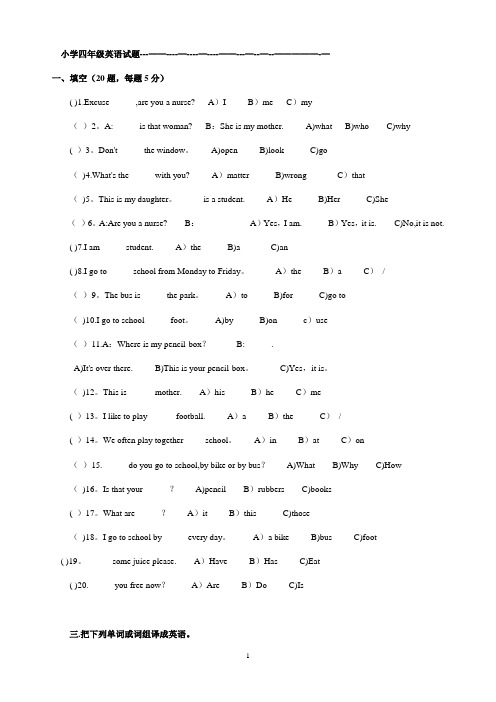
小学四年级英语试题---——----—----—----——---—--—--—————-—一、填空(20题,每题5分)( )1.Excuse______,are you a nurse? A)I B)me C)my()2。
A:______is that woman? B:She is my mother. A)what B)who C)why( )3。
Don't______the window。
A)open B)look C)go()4.What's the______with you? A)matter B)wrong C)that()5。
This is my daughter。
______is a student. A)He B)Her C)She()6。
A:Are you a nurse? B:______ A)Yes,I am. B)Yes,it is. C)No,it is not.( )7.I am______student. A)the B)a C)an( )8.I go to______school from Monday to Friday。
A)the B)a C)/()9。
The bus is______the park。
A)to B)for C)go to()10.I go to school______foot。
A)by B)on c)use()11.A:Where is my pencil-box?B:______.A)It's over there. B)This is your pencil-box。
C)Yes,it is。
()12。
This is ______mother. A)his B)he C)me( )13。
I like to play ______football. A)a B)the C)/( )14。
We often play together_____school。
北京版英语教材二年级下

Lesson 1What time is it?Get up. Get up!What time is it?It ’ s seven o’ clock.What time is it?It ’ s seven thirty. It’ s time to g Have a nice day!Tick, tock, tick, tock,Merrily sings the clock.Tick, tock, tick, tock,Merrily sings the clock.Lesson 2When do you have your dancing lessons? At four thirty.Let ’ s play first.When do you go home, Yangyang?At five thirty.It ’ s five thirty now. Let’ s go Go home – five thirty get up- six thirty Go to school- seven thirty go to bed- nine thirtyTwelve good hours in every day,Time for work and time for play. Twenty-four hours for day and night, Some for darkness and some for light. Lesson 3When do you watch the cartoons?At five fifty.Let ’ s turn on the TV.What time is it?It ’ s nine twenty. It’ s time to go Sleep tight!Good night!Nine twenty - go to bedFive fifty- watch the cartoonsOne forty- go to the drawing lessonsI have a round face but no eyes.I have two hands but no legs.I have no mouth but I can tell.It ’ s the time that I can tell. DEPARTURESTIME DESTINATION FLIGHT7:00SHANGHAI MU51387:10XIAN’CA1203. 8:20CHENGDU3U88969:30CUANGZHOU CZ310810:40XIAMEN MF811812:50CHANGSHA CZ3146A bad bag cat jam vanApple/ flag/ glad /panda/ happy/ handA fat cat is sitting on a black mat. Twenty thirty fiftyWhen do you get up?When do you go to school?When do you go home?Lesson 5What time is it, Dad?It ’ s six thirty. It’ s time for bre What’ s for breakfase, Mum?We have bread, milk, eggs, and fruits. Some milk, bread, and an egg for me, please.Milk bread eggs fruits soy milk noodles Bread and butter,Spice and sugar,Which is better?Lesson 6Can I have fish and rice, please? Yes. Here you are.Meat and noodles for me, please. Sure.Let ’ s sit down.Yangyang, what do you have for lunch?I have a hamburger and ice cream.Fish and rice fried ricerice noodles a mantou and a fried egg My little nose smells yummy,yummy foodMy little nose smells nice, nice food. My little mouth tastes yummy,yummy foodMy little mouth tastes nice, nice food Lesson 7Mum, I ’ m back. I’ m hungry. Hello, dear. Have an orange first. What’ s for supper?We have rice, fish, and vegetables. Good evening, Dad!Hi, Baobao. I’ m thirsty.Have a glass of water, please.Thank you.An orange an egg a hamburgerA hot dog a glass of water a cup of tea A glass of juice a glass of soy milkI scream YouScream Weall scream Forice cream.Lesson 8I fish dish big gift riverKing six film it singThe big fish in my dish,Is my yummy, yummy dish.Draw three kinds of fruits.Draw three kinds of food.Draw three kinds of drinks.Fish rice vegetablesLesson 9 Welcome to my house Welcome to my house!Thank you!Would you like to come to my room? Yes, we ’ d love to.Your bed is big!You have a nice chair.Would you like to sit on it?Thank you.Come to my room read my books Ride my bike play with my toys Go to bed, Kate.Take a rest, Kate.Sleepy or not,Go to bed, Kate.Lesson 10I ’ m thirsty.Let ’ s go to the kitchen.Wow, you have a big fridge there.I ’ d like to have some apple juice. Would you like to use the glass on table?No, thank you.The spoon the chopsticksThe glass the bowlApple juice, orange juice,Drink them with your food.. the. Orange juice, apple juice,They are good for Ruth!Lesson 11Can I use the bathroom, please?Sure. It’ s over there.Thank you.I want to call my mum. Can I use your phone, please?Yes. Go ahead.The bathroom the towel the soap The shampoo the toothpasteGet up, Kate.Wake up, Kate.Awake or not,Get up, Kate.. Lesson 12A phone a book a chair a bedE bed pen red pet get neck leg desk vest jello yellow egg elephantHead breadPet, pet, get off the bed.Pet, pet, get the pen.The bed is in the bedroom.Bathroom bedroom kitchenBed chair tableWoud you like to look at my room? I have a small bed ⋯This is my bedroom. I have⋯Lesson 13 Where is my shirt?Where is my shirt? I can’ t find it. Look! It’ s under the bed.Oh, yes! Thank you, Mum.Where is my coat, Dad?Sorry, I don’ t know.It ’ s behind the sofa.Behind the sofa under the bedIn the box on the deskCoat cap shirt dressWhere are you going, little cat?I am going to town to buy a hat.What? A hat or a cat?A cat with a hat?Lesson 14Is this your jacket, Yangyang?No, it isn’ t.Is this your jacket, Baobao? Yes, it is.Is that your red scarf, Baobao? No, it isn’ t.Where is your red scarf?It ’ s in my schoolbag.Jacket watch cap football Lost & FoundYour head is too round,And your face is too flatTo wear a hat.Lesson 15Are these your shorts?No, they are not.Where are your shorts?They are in my bag.Are these your trousers?No, they are not.Where are your trousers?I don ’ t know. I can’ t find them. Trousers shorts socks shoes John, John,Went to bedWith his pants on,One shoe offAnd one shoe on!Lesson 16Shorts shoes trousers a cap ashirt a coat socksO box dog ox fox long clock mop top hot The dog, the ox, and the fox, each is carrying a box.This is an eraser. I’ m going to hi Where is the eraser? It’ s behind Shirt shorts coatMake your own riddle.It ’ s in the..It ’ s on the..It ’ s under the..Oh, it is an eraser!Lesson 17 How do you go to school? How do you go to school every day, Amy? On the school bus. How about you?I go to school by bus.When do you go to work, Uncle?At 7:30.How do you go to work?I go to work by car.By bus school the cenemaby bike on foot the zoo Train,plane, and ship, Which willyou take?Ship, plane, and train,I will take the plane.Lesson 18How does your dad go to work, Baobao? He goes to work by car.How does your mum go to work?She goes to work by bike. How aboutyour mum?She goes to work on foot.By car by taxi by subwayGo to work your dadGo to see her aunt anduncle LinglingI hope I can fly,I hope I can touch the sky.Spread my wings and fly high,I hope I can fly.Lesson 19How do you go to the farm on Saturday、We go to the farm by subway.Does your grandpa go with you?Yes, he does.Does your uncle come to see you on Sunday?Yes, he does.Does he come by taxi?No, he doesn’ t.Come by taxiGo to the park by subwayGo to the hospital by busLittle boy, little boy,Do you want to go for a ride?Little bike, little bike,I ’ d like to go for a ride.Lesson 20A plne a train a ship a taxiU hut nut cup duck lucky bus lunchA lucky duck finds a hut.In that hut there is a cup.In the cup he sees a nut.Car bus bike taxiHow do you come to school?How many come to school by bus? Lesson 21How many seasons are there in a year? There are four.They are spring, summer, autumn, and winter.I like summer. The sky is blue. The grass and leaves are green.I like winter. I like the white snow. Seasons /a year/ fourdays /a week/seven hours/a day/ 24 Summer is hotWe have no school Autumn is coolWe go back to school.Lesson 22Do you like spring, Lingling?Yes, I do. I like the colourful flowers. How about you?I like autumn. It ’ s cool in autumn. Do you like winter?No, I don’ t like winter. It’ s c But I like winter. I can make a snowman. Do you like winter?Yes, I do./No, I don’ t like winter. Spring summer autumn winterSpring, Spring,Let us sing.We are all happyTo sing for spring.Lesson 23Which season do you like?I like spring. I can fly a kite.I like summer. I go swimming in summer. Which season do you like?I like autumn. We can pick apples.I like winter. We go ice-skating. Seasons/spring/fly akite summer/go camping/autumn/pick apples/winter/play in the snowSping is brightWith flower and song. Summer is hotAnd the days are long. Autumn is richWith fruits and grain. Winter brings snow And a new year again.Lesson 24Colourful flowers White snowThe blue skyGreen grassHow many seasons are there in a year? There are four.Which season do you like?I like .Do you like ?Yes, I do. ⋯No, I don’t.Ar car park star arm card party He has a card for the party in the park. There are many cars in the car park.What’ s this?3 says“C”, 15 says“O”, 12 saIt is“COOL”.Green white spring snow I like winter.The snow is white.⋯。
外研七上Modules5-6阶段测试卷(带答案)

外研七上Modules5-6阶段测试卷(带答案)Ⅰ. 用适当的介词填空1. —Do you have an art lesson at eight fifty?—Yes, we do. We have an art lesson ________ ten ________ nine.2. At school we have meat and vegetables ________ lunch.3. I do my homework ________ the evening, but ________ Saturday or Sunday evening I have no homework.4. Many girls in our class are good ________ art.5. We have a break ________ half ________ ten.6. Students play ________ the playground ________ twenty minutes after school.7. They often have a trip ________ the zoo and there are many kinds ________ animals in it.8. In the zoo, you can see many animals ________ different countries. Some are strong and catch other animals ________ food.9. ________ fact, camels don't carry water ________ the humps ________ their back.10. My sister does well ________ singing.Ⅱ. 根据句意、首字母或汉语提示补全单词1. In the evening I finish my homework and go to s________ at ten o'clock.2. I go to school at seven. Lessons s________ at eight.3. Students have a b________ between classes.4. —Do you like tea w________ sugar?—Yes. I have a sweet tooth.5. Don't eat too much for d________,but eat well for breakfast.6. Summer comes, and ________(然后) autumn.7. —S________ we go shopping for some beans for dinner?—Good idea!8. PE is my favourite subject, because it is i________.9. D________ animals eat different food.10. The old man doesn't live with his children. He lives a________.11. There are 60 m________ in an hour.12. What time do you start ________(劳动) every day?13. I can walk to the park. It is next to my ________(屋子).14. In the morning we have four ________(课). In the afternoon, we have two.15. I know my parents ________(爱) me very much.16. Elephants are ________(强健的) animals and eat many plants and leaves a day.17. Some fish are ________(甚至) as big as an elephant.18. The tiger ________(捕捉) other animals for food.19. Pandas eat about thirty________(公斤) of bamboo a day.20. He gets up, ________(洗) his face and then has breakfast.Ⅲ. 用所给单词的适当形式填空1. These ________(plant) are food for elephants.2. Spring comes and the ________(leaf) of the trees turn green.3. It's ________(danger) to eat bad food.4. Li Ming is good at ________(learn) English.5. Students in Beijing International School are from different ________(country).6. Monkeys are really ________(fun) animals.7. The camel ________(live) in the desert.8. Kangaroos ________(be) Australian animals.9. ________ pandas ________(come) from China?10. There ________(be) some grass on the playground.11. The zebra is an ________(Africa) animal.12. He ________ (watch) TV in the evening.13. There is a girl ________(call) Alice.14. What about ________(eat) some meat for dinner?15. The elephant ________(not eat) meat.Ⅳ. 用方框中所给短语的适当形式完成句子be good at, get up, come from, listen to music, have breakfast, as well as, many kinds of, in the evening, all over the world, a day, go to bed, go to school1. In the evening my sister watches TV, and then ________.2. We get up and ________ at home. We drink juice and eat some healthy food.3. Many animals in the zoo ________ China.4. ________ going shopping, we ate some delicious food of Beijing.5. On Saturday or Sunday I don't ________ early. I like to stay in bed.6. Some day, I will travel ________ with my love.7. My brother ________ from Monday to Friday.8. Parents can talk with their children ________.9. The boys in our class ________ ball games.10. The CD is great. What about ________?11. There are ________ foods and drinks at the party.12. We have seven classes ________.Ⅴ. 句型转换1. The zebra eats bamboo. (改为否定句)The zebra ________ ________ bamboo.2. There is a leaf on the ground. (改为复数句)________ ________ ________ ________ on the ground.3. It is __half__past__eight. (对画线部分提问)________ ________ ________?4. Monkeys are cute and they're also funny. (改为同义句)Monkeys are funny ________ ________ ________ cute.5. The tiger eats __about__ten__kilos__of meat a day. (对画线部分提问)________ ________ meat ________ the tiger ________ a day?6. There are about 200 kinds of monkeys in the world. (对画线部分提问)________ ________ ________ of monkeys ________ ________ in the world?7. Kangaroos live in the grassland. (改为一般疑问句)________ Kangaroos ________ in the grassland?8. Is the panda from China?(改为同义句)________ the panda ________ ________ China?9. They always listen to music and go to concerts. (用he 取代they 改写句子)________________________________________________________________________10. is, a, called, there, panda, Tony (连词成句)________________________________________________________________________?11. We have some new friends in England. (改为否定句)We ________ have ________ new friends in England.12. The zoo has a lot of animals. (改为同义句)________ ________ a lot of animals in the zoo.Ⅵ. 单项选择()1. It's ________ now. Let's go to bed.A. nine halfB. half to nineC. nine and a halfD. half past nine()2. —What are your lessons today?—________.A. I like Chinese bestB. Our English teacher is Miss WangC. We have Chinese, English, PE and mathsD. We don't have English()3. —Do you like maths?—No, I don't. ________ it's difficult for me.A. SoB. ButC. BecauseD. And()4. They often ________ milk and bread for breakfast.A. haveB. drinkC. eatD. do()5. Children usually like animals ________ giraffes and pandas.A. for exampleB. such asC. as forD. because of()6. My mother is pretty good at ________ some shopping. I always buy things with her.A. doingB. didC. doD. done()7. —Shall we go to the zoo on Saturday?—________. I like animals.A. Good ideaB. Thank youC. It's nice of youD. I'm afraid not()8. —Where does the elephant ________?—It ________ Africa and Asia.A. live; liveB. live in; livesC. live; lives inD. live; live in()9. I'd like to get ________ meat. What about you?A. two kilosB. two kilos ofC. two kilo ofD. two kilo()10. ________ the afternoon we have three lessons, but ________ Friday afternoon we have two.A. In; inB. In; onC. On; inD. On; on()11. —It's seven forty-five.—________?Oh, it's time to go.A. Fifteen past sevenB. Fifteen to eightC. Forty-five past sevenD. Fifteen past eight()12. How many lessons ________ on Tuesday afternoon?A. do you haveB. are you haveC. you haveD. you do have()13. In the evening the boy does homework and ________ TV.A. watchesB. lookC. seesD. watch()14. We have to do some shopping because there is ________ milk in the fridge.A. littleB. a littleC. fewD. a few()15. I have too much homework and I'm ________ and tired.A. easyB. difficultC. freeD. busy()16. —________ is your Chinese lesson?—At eleven o'clock in the morning.A. How muchB. What dayC. How manyD. What time()17. The tiger is ________ dangerous animal.A. a kind ofB. a kindC. kinds ofD. kind of()18. ________ the family photo. Can you ________Tony in it?A. Look; seeB. See; look atC. Look at; seeD. Look at; look()19. —Do you like pandas?—Sure. They're my favourite.A. That's all rightB. OKC. Of courseD. You're welcome()20. There's only ________ fruit. Let's go shopping for some.A. littleB. a lotC. a littleD. many()21. —When do you usually have your lunch?—________ 12:30 ________ the afternoon.A. At; inB. In; atC. In; inD. On; on()22. —Is he an American or ________?—He's from ________.A. African; AfricaB. African; AfricanC. Africa; AfricaD. Africa; AfricanⅦ. 用方框中所给单词或短语的适当形式完成漫笔get, past, go to school, go home, start, interesting, then, have lunch, lessonDear Daming,This is my school day. In the morning I 1. ________ up at six o'clock. 2. ________,I have breakfast and 3. ________ with my friend. Usually, we get to school at half 4. ________ seven. We 5. ________ our class at eight o'clock. In the morning, we have three 6. ________. I like the second lesson very much. It is English. It is difficult but very 7. ________. At half past eleven, we 8. ________ in the school dining room. In the afternoon, I have three lessons. At about half past four, I 9. ________.Yours,TomⅧ. 情形交际从方框中选出能填入空白处的最佳选项。
